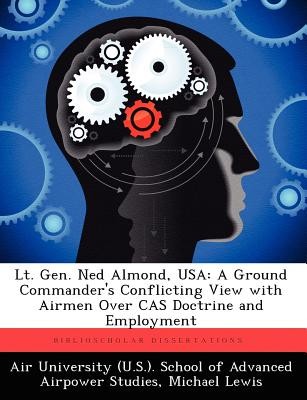
- We will send in 10–14 business days.
- Author: Michael Lewis
- Publisher: BiblioScholar
- ISBN-10: 1249415691
- ISBN-13: 9781249415695
- Format: 18.9 x 24.6 x 0.9 cm, minkšti viršeliai
- Language: English
- SAVE -10% with code: EXTRA
Reviews
Description
This study analyzes the historical debate between the Army and Air Force over the issue of close air support (CAS). Specifically, this thesis examines four CAS sub-issues from World War I through the Korean War: priorities in the employment of airpower, the ownership and apportionment of CAS assets, the most effective CAS command and control (C2) system, and the debate over whether to procure a single- or multi-purpose CAS aircraft. A fundamental explanation given for Army and Air Force differences in philosophy on CAS is the historical difference in military objectives (decisive points). This difference has shaped air force, force structure and air asset employment, and significantly contributed to the Army-Air Force CAS debate.The case study portion of this paper analyzes the CAS philosophy of Lieutenant General Edward Mallory Almond, US Army. The author reasoned that General Almond's diverse background in Army, Navy, and Air Force theory and employment would make him a logical candidate for study. The main focus of this paper is on CAS employment and issues during the Korean War. General Almond served in World War I and World War II, and commanded the X Corps during the Korean War. His personal papers stored at the Military History Institute, Carlisle Barracks, Pennsylvania, offer unique insights into a ground commander's views on CAS.While his opinions are much more complex than this short abstract can do justice to, Almond's CAS thoughts evolved to the following: 1) air priorities should be - first, air superiority; second, CAS; and then interdiction and strategic attack, 2) the Army should maintain operational control of sufficient (meaning 'lots of') CAS air assets and practice decentralized control (down to the division or corps level), 3) the services should build and adequately staff joint, well-integrated CAS C2 systems to support the CAS mission, and 4) the Air Force should build, with Army inputs, a single-purpose CAS aircraft. While readers may
may n
EXTRA 10 % discount with code: EXTRA
The promotion ends in 24d.03:03:56
The discount code is valid when purchasing from 10 €. Discounts do not stack.
- Author: Michael Lewis
- Publisher: BiblioScholar
- ISBN-10: 1249415691
- ISBN-13: 9781249415695
- Format: 18.9 x 24.6 x 0.9 cm, minkšti viršeliai
- Language: English English
This study analyzes the historical debate between the Army and Air Force over the issue of close air support (CAS). Specifically, this thesis examines four CAS sub-issues from World War I through the Korean War: priorities in the employment of airpower, the ownership and apportionment of CAS assets, the most effective CAS command and control (C2) system, and the debate over whether to procure a single- or multi-purpose CAS aircraft. A fundamental explanation given for Army and Air Force differences in philosophy on CAS is the historical difference in military objectives (decisive points). This difference has shaped air force, force structure and air asset employment, and significantly contributed to the Army-Air Force CAS debate.The case study portion of this paper analyzes the CAS philosophy of Lieutenant General Edward Mallory Almond, US Army. The author reasoned that General Almond's diverse background in Army, Navy, and Air Force theory and employment would make him a logical candidate for study. The main focus of this paper is on CAS employment and issues during the Korean War. General Almond served in World War I and World War II, and commanded the X Corps during the Korean War. His personal papers stored at the Military History Institute, Carlisle Barracks, Pennsylvania, offer unique insights into a ground commander's views on CAS.While his opinions are much more complex than this short abstract can do justice to, Almond's CAS thoughts evolved to the following: 1) air priorities should be - first, air superiority; second, CAS; and then interdiction and strategic attack, 2) the Army should maintain operational control of sufficient (meaning 'lots of') CAS air assets and practice decentralized control (down to the division or corps level), 3) the services should build and adequately staff joint, well-integrated CAS C2 systems to support the CAS mission, and 4) the Air Force should build, with Army inputs, a single-purpose CAS aircraft. While readers may
may n


Reviews